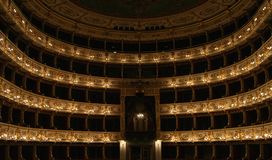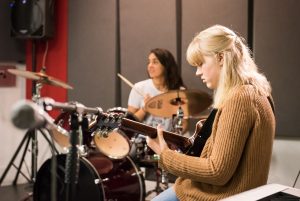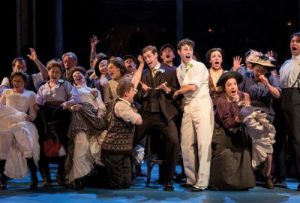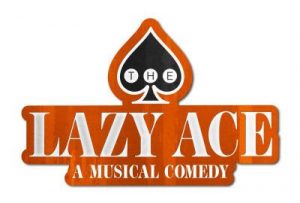|
Of course the evening, in many ways, belongs to Charlie Stemp as Arthur. A Laine-trained dancer he leaps ebulliently round the stage with mercurial athleticism and neat feet. He also makes Arthur by turns, rueful, earnest, troubled, joyful and eventually happy. Stemp has a fine singing voice both in solo work and in duets and other groups. He more than deserves the tumultuous applause he gets as he and Devon-Elise Johnson as Ann (also very good) dance off the stage – still fizzing with infectious energy even after the curtain call. Paul Brown’s designs are a key part of the success of this show too. The set is based on a revolving mock wrought iron arrangement which is a cross between a bandstand and a gasometer. Screens within it drop and lift to display or reveal different sets – a pub bar for example or the counter of the draper’s shop. It’s both imaginative and ingenious. And the sumptuous costumes – a lot of Edwardian white and delightful black and yellow for Lady Punnet’s party – add a lot. There are some really memorable songs in this show, many of them rooted in tuneful, witty, music hall tradition. The fast, furious and funny Flash Bang Wallop is now the finale and is a theatrical roller coaster treat as you listen for the words of each verse and enjoy the way it hangs on the pause before it returns to the chorus. It is to this show what Sit Down You’re Rocking the Boat is to Guys and Dolls. |
| Originally published by Sardines: http://www.sardinesmagazine.co.uk/reviews/review.php?REVIEW-Chichester%20Festival%20Theatre%20(professional)-Half%20a%20Sixpence&reviewsID=2492 |
|
|
|
|
|
|
|
Three Pauline Quirke academies, two from Hertford and one from Preston, come together to present The Lazy Ace, a cheerful Las Vegas-set musical by Terry Ronald which owes a bit of a debt to Guys and Dolls. The logistics of managing 200 youngsters aged 5-18 backstage don’t bear thinking about but from the front it looked slick and professional and what an experience for these young people to be on stage at Her Majesty’s Theatre, a professional West End venue. The piece comprises a strong book with interspersed (plot-appropriate) songs borrowed from elsewhere, arranged by Melanie P Crouch. These include Luck Be a Lady, Jailhouse Rock and Let It Go so there’s plenty of varied material for these very well directed, often talented young performers to get their teeth into. Six separate scenes are presented by the three Academies which do two each. Distinctive costumes (supervised by Anita Barrett) ensure that the whole thing flows and we always know who everyone is – with Angel Applewood in navy and amber, Macey De Lacy in scarlet satin and, Jakey Ground, the owner of the Sneaky Slammer Casino in emerald green tuxedo. The ensemble dancing is fast and confident throughout and much of the chorus singing is very clear and incisive. Solo singing tends to be valiant rather than accomplished but it doesn’t affect the overall sense of joie de vivre and vibrance of the show. Much of the acting is really very truthful and convincing with Connor Fitzgerald from PQA Hertford AM as the charismatic and mysterious Sonny giving the most outstanding performance of the evening. Of course, at a show like this most of the audience are enthusiastic parents and other family members so the atmosphere is very supportive. Yes, as the ever-ebullient Pauline Quirke, herself summed it up from the stage at the end these children did brilliantly and their families are more than entitled to feel very proud of the achievements of their children. |
| First published by Sardines: http://www.sardinesmagazine.co.uk/reviews/review.php?REVIEW-West%20End%20&%20Fringe-The%20Lazy%20Ace%20-%20a%20musical%20comedy&reviewsID=2491 |
|
|
|
|

Standing ovations, which should be reserved only for things which are outstanding and extraordinary, are given much too readily these days in my opinion. But nothing could have stopped me from leaping to my feet in sheer pleasure and excitement at of the end of this astonishing piece of theatre – probably the best thing I’ve ever seen at Open Air Theatre, Regents Park and there’s been plenty of good work to choose from over the years.
From the moment the first guitar begins to twang at the opening of the overture you are on the edge of your seat. And it’s an inspired idea to position the band in two groups fifteen feet or so above the action framed at the top of the two rusty scaffold-like blocks which form the base of Tom Scutt’s set. It means that you can see the instrumentalists playing the colourful orchestration which characterises Andrew Lloyd Webber’s remarkable score. I’m first and foremost a classical music person but have come to the conclusion, since I first saw Jesus Christ Superstar several times n the 1970s, that this piece – every inch a fully fledged opera – is as great in its way as Don Giovanni or La Boheme.
And it works, of course, partly because the narrative is so powerful and in this case the cast, director and sound engineer ensure that we hear every single word and that’s rare. The central tension between Judas (Tyrone Huntley) driven initially by a sort of reasoned common sense and eventually destroyed by guilt and the passive, troubled Jesus (Declan Bennett) is impeccably directed. Timothy Sheader has excelled himself. The moment when Judas and Jesus confront each other in a troubled, edgy syncopated 5/4 time interspersed with the apostles’ conventional maudlin hymn-like chorus is nicely pointed up too.
And in the second half – dusk evocatively falling (even more than it should have been because the show went up nearly half an hour late on press night thanks to a technical issue) – Bennett, dripping with blood, quivers and twitches in agony and anguish, His light tenor singing voice is suitably gentle, occasionally cracking into falsetto, or becoming ragged with pain. His control is very impressive.
Other high spots – and they come thick and fast – include the contrast between Bennett’s mild voice and the gravelly basso profundo of Cavin Cornwall’s dangerously charismatic Caiaphas. King Herod’s Presley-style number is a famous set piece show stopper and Peter Caulfield squeezes every possible drop of outrageous humour out of it. Anoushka Lucas’s Mary sings the well known lyrical numbers with moving warmth and Phil King, an actor musician like Bennett, is strong as Simon Zealotes especially during the denial.
Plenty of hugely enjoyable individual performances then, but what really makes this show special is the quality of the pulsing, vibrant, relentlessly energetic ensemble work. Drew McOnie’s very original choreography creates a visual narrative so that there’s an ongoing, mostly high speed, dance drama which complements the feelings being expressed in words. They leap, sweep their limbs in arcs, drum their feet in magical unison. It is tremendously exciting to watch.
Bravo to everyone who has worked on or is involved with this magnificent show. I predict that the run in the park is just the beginning of its life, I shall be surprised if it doesn’t both transfer into the West End and tour.
Originally published by Sardines http://www.sardinesmagazine.co.uk/reviews/review.php?REVIEW-Regent%E2%80%99s%20Park%20Open%20Air%20Theatre%20(professional%20productions)-Jesus%20Christ%20Superstar&reviewsID=2488


A theatre is not a picnic park. The play’s the thing. Eating and drinking are for elsewhere. There has been a lot of debate about this lately in the pages of The Stage and on social networks. So it’s time I weighed in. Obviously.
Traditionally gentlemen bought rustly chocolates to impress the ladies they were entertaining. Theatres sold said expensive chocolates at huge profits. Some still do. And they shouldn’t. Given the price of theatre tickets these days there is no excuse for further profiteering.
Worse – much worse – are the snacks cheerfully sold in many theatres to encourage punters first to open their wallets and second to disturb people around them. And the very worst offender is popcorn because it smells so frightful.
Then there’s the stuff people bring in – and nobody stops them. I’ve sat next to people eating sandwiches, crunching crisps like manic goats and even, on one occasion, eating a Chinese takeaway with a fork. Nice, if you’re the consumer and you’re hungry maybe but just imagine the stench for everyone else.
And that’s before you start on drink. Theatre bars are there to make (handsome) profits. So the general rule is now that anything goes provided it’s in a plastic glass – and you bought it in the theatre. Woe betide you, incidentally, if you got it elsewhere. On the one occasion I arrived at an 11.00 am children’s show having travelled for two hours and just had time to buy a cup of tea in a lidded cup from the coffee shop over the road, Front of House was down on me like a ton if bricks and I had to dump it. So this ‘relaxed’ attitude is definitely about profits rather than about the comfort, convenience or pleasure of theatre goers.
Most theatre seats are very cramped. They make economy class look quite luxurious. We sit so close to strangers in theatres that under other circumstances we might regard it as an invasion of personal space. That is why – if we are to share and enjoy the enhancing experience of theatre – it is vital that we respect each other. And, as far as I’m concerned, that does not include having someone else’s beer or wine poured on my feet or in my lap, usually by that couple who are – naturally – last in because they bought the seats in the middle.
We could change this culture. There is absolutely no need for snacking at the theatre. Sixty to ninety minutes is the usual maximum between breaks. No one will die of hunger or thirst in that time. Stewards at The Globe are successfully vigilant about cameras. The same attention could easily be paid to food and drink. Children’s theatres, Unicorn and Polka have a no eating and drinking rule and it’s fine.
Meanwhile I shall continue to glare – with as much disapproving venom as I can muster – at the crunchers, rustlers and munchers with their smelly snacks along with the teetering bearers of those full glasses in a very confined space. But I could do with some support.

William Rossetti was an arty, bookish, party-loving Brit. But someone in the family had to earn some money.
Brainy bunch
The four Rossettis, whose Italian father had arrived broke in London in the 1830s, were a clever lot.
Dante Gabriel Rossetti painted dreamy, full- lipped, flower-power pics aka Pre-Raphaelite paintings which now fetch many millions of dollars and adorn tourist-pulling art galleries all over the world.
And his squeamishly religious kid sister Christina wrote passionate poems about:
Goblins. Two sisters are up to no good in a wood with a posse of goblins who come ‘hobbling, / flying, running leaping, / Puffing and blowing, / Chuckling, clapping, crowing, / Clucking and gobbling, / Mopping and mowing’ Then, goblins ‘chattering like magpies ‘ and fluttering like pigeons,’ it all gets a bit touchy-feely.
Crocodiles. In ‘My dream’ sinister sexy crocodiles swell up and gobble each other.
Christmas. Boy, was it cold in Christina’s world. ‘In the bleak mid-winter / Frosty wind made moan. / Earth stood hard as iron / Water like a stone.’
Death: ‘Remember me when I am gone away. Gone far into the silent land.’
Because it’s such a tasty mix, her stuff is more popular today than it’s ever been.
Even Maria, the eldest Rossetti, and the one you guys probably never heard of, learned Latin and Greek almost before she was out of diapers and translated the whole of Dante into English.
William the responsible
But it was poor William, the third Rossetti sib, who just had to pick up the pieces and keep the family show on the road while everyone else got on with being brilliant. And did he feel jealous? You bet he did.
Because you see, he was no less artistic, excitable or talented than his brother or sisters. He just drew the short straw instead of world famous pictures.
So he’s only remembered as having been brother to Dante Gabriel and Christina (and, just for good measure eventually son-in-law to the painter Ford Maddox Brown. They liked to keep art firmly in the family, these Rossettis.)
A small matter of finding art school fees
By the time Dante Gabriel (plain ‘Gabriel’ to his family) was in his teens he was clearly a Seriously Talented Boy. Studying art at London’s famous Royal Academy was the only thing for him. But poor old Mr Rossetti, couldn’t pay. A rather romantic Neapolitan immigrant who had been teaching Italian at Kings College London, he was now ill and could no longer work. Family wealth? None.
So it was all hands to the pump. William took a job as an excise clerk to support his brother. As soon as they were old enough his sisters took live-in jobs as governesses. They loathed it so quit. William however went on pushing dull pieces of paper around Civil Service desks for the rest of his working life, dutifully bailing out first this member of his brilliant, but hard-up, family and then that. Bitter? If so he didn’t shout about it.
One of the lads
The young William hung around with his brother. Then Dante Gabriel, Holman ‘Light of the World’ Hunt and John Everett Millais started the famous Pre-Raphaelite Brotherhood, a boys’ club dedicated to old fashioned painting.
They used to meet clannishly in a dark upstairs room in the Rossetti home in Charlotte Street, London, near the British Museum in Bloomsbury. William was one of seven full members. He edited the short-lived Pre-Raphaelite magazine The Germ – and no, it wasn’t catching. But it was supposed to contain the germ of lots of ideas.
Once Dante Gabriel had left home and gone to live in an exotic (he kept a wombat in the garden) London house in Chelsea, there were parties so wild that Dante Gabriel’s mother and sisters were scared to call without an appointment.
On one occasion three well-boozed young men – Dante Gabriel, William and the poet Algeron Swinburne – were heard and seen sliding naked down the banisters. So William was no stooge. He too could easily have been a tearaway if he’d had the chance to indulge himself.
Two sisters and a mother to keep
Dante Gabriel eventually got famous and made money (he also got married, addicted to chloral – a lethal cocktail of whisky and laudanum – and died, but that’s another story). At least his brother didn’t have to stump up for him.
But old Mrs Rossetti and her daughters were usually a bit short of the ready. Christina made a bit from her poems after her first volume was published in 1862, but not enough to live on.
So William carried on doing the grown up thing at the Excise Office. At the same time he moonlighted as an editor and writer of history books. And, like all the Rossettis, he spoke fluent Italian so could do translations.
Whether Dante Gabriel now chipped in to the family budget is not recorded. He loved to paint luscious, long haired, red-headed beauties. Sometimes he coaxed them in off the street so perhaps his mind was on matters other than his mother’s bills.
William too might have liked to paint Janey Morris – wife of William Morris and Dante Gabriel’s lover and favourite model. Or perhaps he would have liked time to pen some of the purple poetry Dante Gabriel was writing when he didn’t have a brush in his hand: ‘The Blessed Damozel’ and other such lurid stuff. But, alas, William was only the kid brother. And someone had to pick up the tab.
Marriage
Things got really tricky when the long-suffering William got set on marrying Lucy Maddox Brown. Her pa had been involved in the original pre-Raphaelite thing. So she and William had known each other for ever – since Lucy was a small child. When they married she was 30. He was 44.
And one house was not large enough – nothing to do with the number of beds and baths – for the independently- minded Lucy, the fiery Christina, the pious Maria and their lively mother. So William had to set up separate quarters nearby while continuing to subsidise his womenfolk. Maria soon decamped to a seaside convent. There she took the veil, took ill and died not long after.
The saintly survivor
William’s reward for his sustained selflessness was to outlive all the three siblings who had cost him so much for so long. Christina, who died painfully of breast cancer in 1894, was the last of the three to go. So what did he do then? He wrote a family history, edited all Christina’s poetry and generally looked after family interests, supported by his four children. He finally died in 1911, aged 82.
Sources:
Christina Rossetti by Jan Marsh (1994)
Christina Rossetti by Frances Thomas (1992)
Trying not to be first: A life of Christina Rossetti by Kathleen Jones (1991)
The Poetical Works of Christina Georgina Rossetti with Memoir and Notes by William Michael Rossetti (1904)
William Morris: A life for our time by Fiona MacCarthy (1994)
Cardiff is the theatre capital of Wales as well as the political one. Its busy cultural life encompasses the Wales Millennium Centre, Sherman Theatre and New Theatre, and it is home to National Theatre Wales and Welsh National Opera. Not surprisingly, Welsh performing arts training opportunities tend to be focused in the city.
Lending vibrance to Cardiff is Royal Welsh College of Music and Drama – the only conservatoire in Wales…
Read the rest of this article in The Stage: https://www.thestage.co.uk/features/2016/training-in-wales-has-something-to-offer-students-at-all-levels/
 Weeks of school holidays stretch ahead. How do you entertain, occupy, amuse and perhaps stretch the little darlings, especially when you also have to earn the family’s living, and the idea of devoting six weeks of your own time to them is impossible?
Weeks of school holidays stretch ahead. How do you entertain, occupy, amuse and perhaps stretch the little darlings, especially when you also have to earn the family’s living, and the idea of devoting six weeks of your own time to them is impossible?
The answer is seek out one (or several) of the hundreds of holiday clubs to take the little ones (and bigger ones) off your hands for anything from a few hours to several days ….
Read the rest of this article in The Daily Telegraph http://www.telegraph.co.uk/education/2016/07/23/schools-out-now-how-to-entertain-the-children/:

Roundhouse Summer Projects. Credit: Ellie Pinney
Nobody uses the word ‘education’ at the Roundhouse. “Work by, with and for 11-25 year olds is our whole purpose. It underpins everything we do,” says chief executive and artistic director Marcus Davey. He is chatting to me in the organisation’s sparkling new offices, greenly and economically constructed from 72 shipping containers.
The figures he rattles off are impressive. Three thousand young people….
Read the rest of this article https://www.thestage.co.uk/opinion/2016/susan-elkin-for-some-of-us-education-is-more-than-just-a-word/
 Yes, it’s another Chichester triumph which will very soon be romping joyously into the West End. This comedy of social class and socialism, based on HG Wells novel Kipps, first saw the light of day in 1963, written by Beverley Cross and David Heneker for Tommy Steele who played Arthur Kipps. Now reworked with book refreshed by Julian Fellowes and lots of new Stiles and Drewe songs and lyrics, it’s deliciously fresh with a party scene as good as anything in My Fair Lady and echoes of both the Ascot and the drawing room scenes. Add to that the skilled direction of Rachel Kavanaugh, and Andrew Wright’s stunningly original choreography and you’re onto a sure fire winner.
Yes, it’s another Chichester triumph which will very soon be romping joyously into the West End. This comedy of social class and socialism, based on HG Wells novel Kipps, first saw the light of day in 1963, written by Beverley Cross and David Heneker for Tommy Steele who played Arthur Kipps. Now reworked with book refreshed by Julian Fellowes and lots of new Stiles and Drewe songs and lyrics, it’s deliciously fresh with a party scene as good as anything in My Fair Lady and echoes of both the Ascot and the drawing room scenes. Add to that the skilled direction of Rachel Kavanaugh, and Andrew Wright’s stunningly original choreography and you’re onto a sure fire winner.